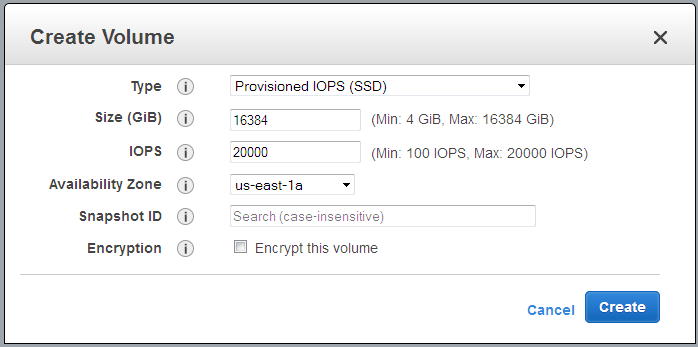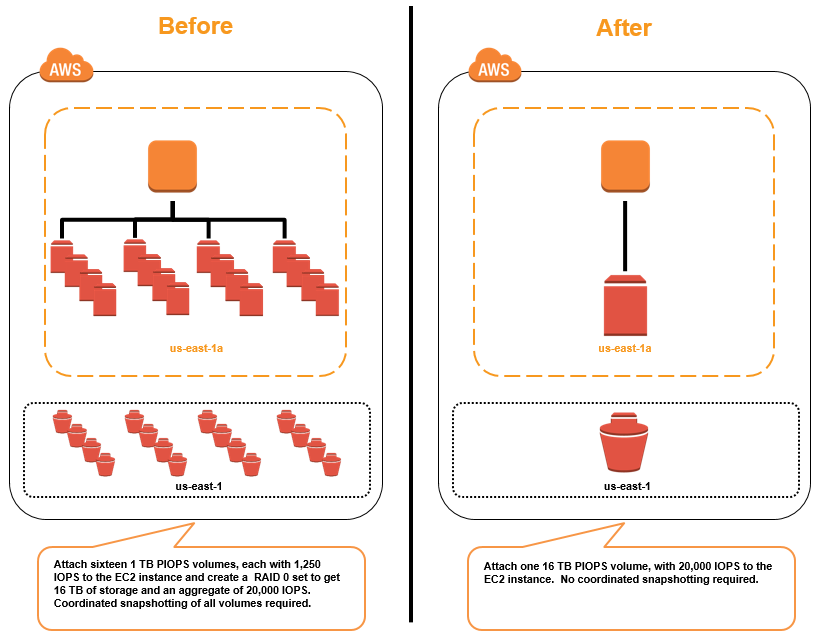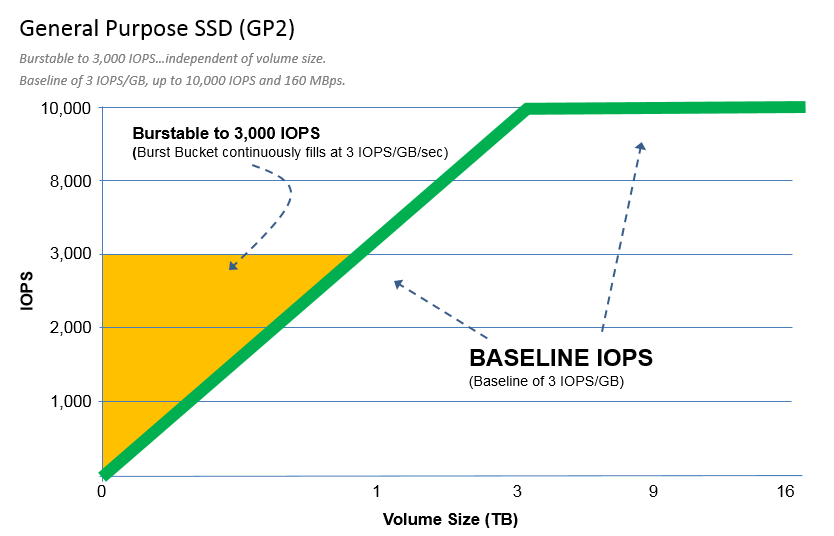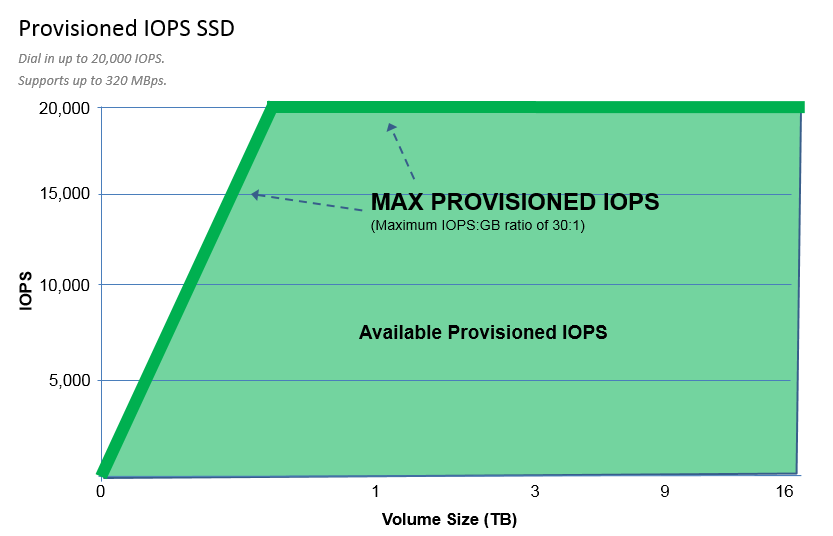AWS News Blog
Now Available: 16 TB and 20,000 IOPS Elastic Block Store (EBS) Volumes
Last year I told you about Larger and Faster EBS Volumes and asked you to stay tuned for availability. Starting today you can create Provisioned IOPS (SSD) volumes that store up to 16 TB (terabytes) and process up to 20,000 IOPS, with a maximum throughput of 320 MBps (megabytes per second). You can also create General Purpose (SSD) volumes that store up to 16 TB and process up to 10,000 IOPS with a maximum throughput of 160 MBps.
To get started, simply specify the desired Size and IOPS using the AWS Management Console, AWS Command Line Interface (AWS CLI), AWS Tools for Windows PowerShell, or by calling the EC2 API (no SDK or tool updates are needed):

As a refresher, EBS supports two SSD volume types:
- Provisioned IOPS (SSD) volumes, introduced in 2012, are designed for I/O-intensive workloads that require consistent performance, such as relational and NoSQL databases. This volume type allows you to provision the exact level of consistent performance that you need and pay for only what you provision.
- General Purpose (SSD) volumes, launched last June, are the default EBS volume type for Amazon EC2 instances and are suitable for a broad range of bursty workloads, including small- to medium-sized databases (either NoSQL or relational), dev and test environments, and boot volumes.
Both SSD volume types are designed to offer single-digit millisecond latencies and five 9s (99.999%) of availability.
This enhancement is a continuation of our promise to help customers to focus on their core business rather than on managing resources. With this release, you no longer need to stripe together several smaller volumes in order to run applications requiring large amounts of storage or high performance, including large transactional databases, big data analytics, and log processing systems. The volumes also make backing up your data easier, since you no longer need to coordinate snapshots across many striped volumes.
The following picture illustrates the reduction in complexity that is now possible. Instead of creating a RAID set composed of 16 EBS volumes (Before), you can now create a single, larger volume (After). This volume can host a 16 TB and 20,000 IOPS I/O-intensive transactional database requiring single digit millisecond latencies with consistent performance using Provisioned IOPS (SSD) on AWS:

Larger & Faster Volumes
With today’s launch, the General Purpose (SSD) volumes are now designed to deliver a consistent baseline performance of 3 IOPS/GB to a maximum of 10,000 IOPS, and provide up to 160 MBps of throughput per volume. Here are the rules:
- Volumes smaller than 1 TB can still burst beyond their baseline IOPS to 3,000 IOPS. For example, a 100 GB volume has a baseline of 300 IOPS and the ability to burst to 3,000 IOPS.
- Volumes larger than 1,000 GB can have a baseline of up to 10,000 IOPS. For example, a 2,000 GB volume will have a baseline of 6,000 IOPS, and volumes from 3,334 GB up to 16,384 GB will all get a baseline of 10,000 IOPS.
My colleague Dave Veith illustrated the relationship between the values as follows:

The ability to burst IOPS has proven to be extremely useful to our customers. In fact, after looking at historical data, we found that the vast majority of our customers have never emptied their burst buckets!
Here’s another helpful picture from Dave:

The throughput values listed above apply when the volumes are attached to EBS-Optimized EC2 instances. The actual throughput that you will see in practice can vary based on instance type, file system type, and your application’s unique usage pattern. For more information, please take a look at Amazon EBS Volume Performance on Linux Instances and Amazon EBS Volume Performance on Windows Instances.
Looking Back, Moving Ahead
To recap a bit, in the past nine months, we have released several products and feature enhancements for our customers. In June 2014 we released our new default volume type, General Purpose (SSD), and three months later we doubled the maximum achievable throughput for Provisioned IOPS and GP2 volumes. In addition to these releases, we offered additional data protection via seamless encryption of EBS data volumes and snapshots, and followed up with the ability for customers to create and manage their volume encryption keys.
Now we are increasing the maximum size and performance of these volume types. To say the least, it’s been a busy few months, but we have a lot more in store!
Now Hiring
If you are excited about the incredible opportunity cloud computing represents, have experience with distributed systems, and thrive on building and driving great teams to deliver high quality software, this is the team for you. For more information please visit the EBS Careers page.
EBS at the AWS Summits
Members of the EBS team will be available to meet with you at the upcoming AWS Summits. If you would like to schedule some time with one of them, please reach out to your AWS sales rep.
Available Now
The larger and faster EBS volumes are available now and you can start using them today in all AWS regions. For more information, please visit our technical documentation.
— Jeff;
PS – In order to keep this post clean and straightforward, I have used the more common terabytes (10004 bytes) instead of the more accurate tebibytes (10244 bytes).